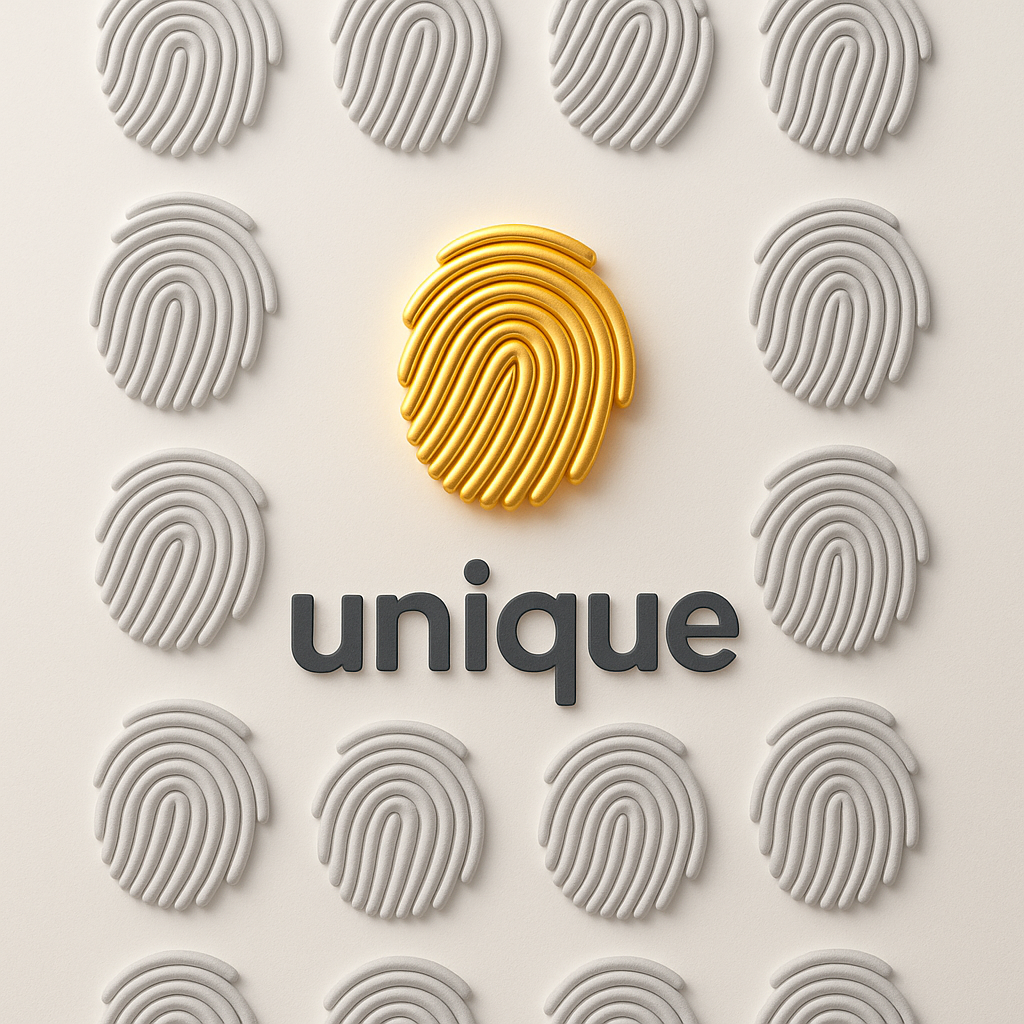Unique
Definition
Unique refers to being the only one of its kind, unlike anything else. It can also describe something remarkable, special, or unparalleled.
Parts of Speech
- Adjective
Pronunciation
American English
- IPA Pronunciation: /juˈniːk/
- Respelling: yoo-NEEK
British English
- IPA Pronunciation: /juˈniːk/
- Respelling: yoo-NEEK
Etymology
The word "unique" originates from the Latin "unicus," meaning "only, sole, or single," derived from "unus," meaning "one." The term was adopted into French and then into English in the early 17th century, retaining its sense of singularity or exclusivity.
Derivatives
- Uniquely (adverb)
- Uniqueness (noun)
- Nonunique (adjective)
- Uniqueism (noun, rare)
- Uniquify (verb, informal)
Synonyms
- Singular
- Exceptional
- Distinctive
Antonyms
- Common
- Ordinary
- Typical
Usage
The adjective "unique" is used to describe something that stands out for its individuality or special qualities. For example, "Each snowflake is unique in its design." It is often used to emphasize the singular nature of a person, object, or idea.
Related Terms
- Rare: Uncommon or infrequent.
- Exclusive: Limited to a specific group or situation.
- Exceptional: Extraordinary or unusual in a positive way.
Detailed Definitions
Adjective
- Being the only one of its kind: Refers to something that has no equal or equivalent.
- Example: "The museum houses a unique collection of ancient artifacts."
- Unusual or remarkable: Describes something extraordinary or noteworthy for its characteristics.
- Example: "Her style is unique and instantly recognizable."
- Characterized by singular qualities: Refers to possessing distinctive or special traits that set it apart.
- Example: "The architect designed a unique building that stands out in the city skyline."
unique



🇨🇳 Mandarin (Simplified Chinese)
- 独特
- IPA: /tu˨˩˦ te˥˩/
- English Respell: Du te
- 唯一
- IPA: /wei˧˥ i˧˥/
- English Respell: Wei yi
🇮🇳 Hindi
- अद्वितीय
- IPA: /əd̪ʋiːt̪iːj/
- English Respell: Advitiya
- अनोखा
- IPA: /ənoːkʰaː/
- English Respell: Anokha
🇪🇸 Spanish
- Único
- IPA: /ˈuniko/
- English Respell: Unico
- Inigualable
- IPA: /iniɣwalable/
- English Respell: Inigualable
🇫🇷 French
- Unique
- IPA: /ynik/
- English Respell: Unique
- Inégalable
- IPA: /inegalabl/
- English Respell: Inegalable
🇸🇦 Modern Standard Arabic
- فريد
- IPA: /fariːd/
- English Respell: Fareed
- مميز
- IPA: /mumiːz/
- English Respell: Mumeiz
🇧🇩 Bengali
- অনন্য
- IPA: /ɔnɔnjɔ/
- English Respell: Ononyo
- অনুপম
- IPA: /ɔnupɔm/
- English Respell: Onupom
🇷🇺 Russian
- Уникальный
- IPA: /ʊnʲɪˈkalʲnɨj/
- English Respell: Unikal'nyy
- Неповторимый
- IPA: /nʲɪpɐvˈtorʲɪmɨj/
- English Respell: Nepovtorimyy
🇵🇹 Portuguese
- Único
- IPA: /ˈunikʊ/
- English Respell: Unico
- Inigualável
- IPA: /ĩniɡwalavel/
- English Respell: Inigualavel
🇮🇩 Indonesian
- Unik
- IPA: /unik/
- English Respell: Unik
- Satu-satunya
- IPA: /satu-satuɲa/
- English Respell: Satu-satunya
🇩🇪 German
- Einzigartig
- IPA: /ˈaɪ̯nt͡sɪçˌʔaʁtɪç/
- English Respell: Einzigartig
- Unvergleichlich
- IPA: /ʊnfɛɐ̯ˈɡlaɪ̯çlɪç/
- English Respell: Unvergleichlich
🇯🇵 Japanese
- ユニーク
- IPA: /juɲiːkɯː/
- English Respell: Yuniku
- 独特
- IPA: /dokutoku/
- English Respell: Dokutoku
🇻🇳 Vietnamese
- Duy nhất
- IPA: /zʊi˨˩ ɲaːt˧˧/
- English Respell: Duy nhat
- Độc đáo
- IPA: /ɗɔk˦ˀ˥ ɗaːw˧˩˧/
- English Respell: Doc dao
🇰🇷 Korean
- 독특한
- IPA: /dok̚.tʰɯk̚.han̚/
- English Respell: Dokteukhan
- 유일한
- IPA: /ju.il.han/
- English Respell: Yuilhan
🇹🇷 Turkish
- Eşsiz
- IPA: /eʃsiz/
- English Respell: Essiz
- Benzersiz
- IPA: /benzeɾsiz/
- English Respell: Benzersiz
🇵🇰 Urdu
- یکتا
- IPA: /jʊktaː/
- English Respell: Yukta
- بے مثل
- IPA: /beː mɪsl/
- English Respell: Be misl





